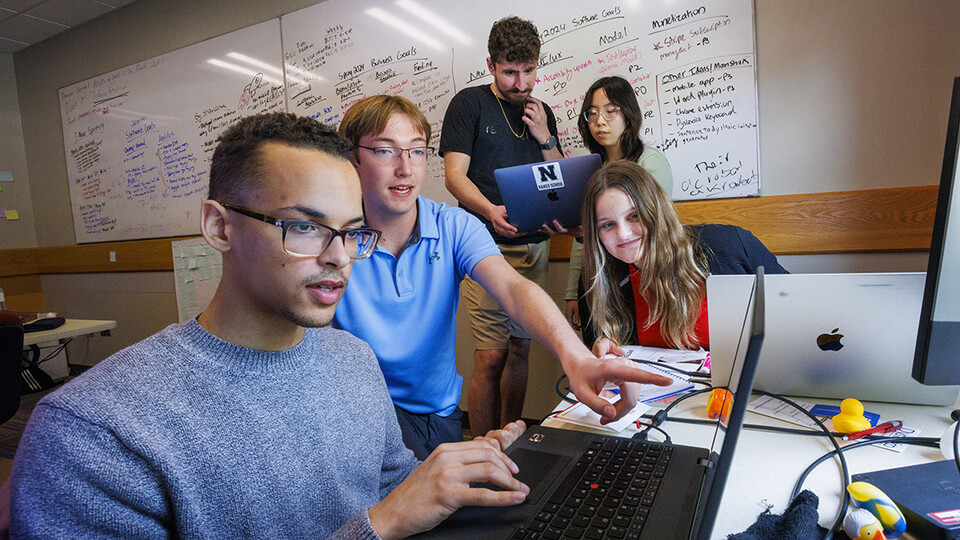
A team of Huskers is creating a practical writing tool that can also help form better education plans for students with dyslexia.
Dyslexico, part of the Design Studio in the University of Nebraska–Lincoln’s Jeffrey S. Raikes School of Computer Science and Management, is building a spell and grammar check program to aid people with dyslexia in their writing. The program uses AI to catch more errors and suggest more accurate corrections.
“We want them to be able to understand why errors are happening and be able to validate it themselves to increase their confidence as writers and use it in settings like school,” said Bridget Peterkin, senior computer science major in the Raikes school and co-founder. “We want to not only be able to help them get it right but help them learn and participate in the education process.”
The program has many of the functions of a typical spell or grammar check software, but it is designed to address the specific needs of people with dyslexia. Someone with dyslexia might, for example, misspell a word more incorrectly than other people, or a word might be spelled correctly but is not the intended word. In cases like this with very high error rates, other software might “give up” or even mistake the sentence for another language and stop checking it. Users go through the suggestions and confirm the change, which improves their identification and understanding of the mistakes.
Dyslexico uses AI to put the mistakes in context of the entire sentence and offer better suggestions. In one example, a student wrote “The knife is sharp” but had misspelled the word “sharp.” A traditional spell check changed the word to “shop,” while Dyslexico recognized that the sentence was referring to kitchen utensils and suggested the correct spelling.
“A more general error might be someone making a flub on the keyboard or messing up a common letter mix-up,” Peterkin said. “With dyslexia, we tend to see larger patterns. (Other programs) will guess the closest word instead of the word that is right in context.”
In the team’s data analysis, Dyslexico detected and corrected three times as many errors as other common spell check programs.
Dyslexico originated when co-founder and Husker alumna Grace Clausen, who has dyslexia, won a “hack-a-thon” programming competition hosted by OpenAI. The project was then accepted into the Raikes school’s start up incubator beginning in the fall 2022 semester. Claussen has dyslexia so she had firsthand experiences with these challenges, and then started to watch sister go through same challenges.
“We knew there had to be a better option and this population had been left behind by existing solutions,” Peterkin said.
Other features included are access to the font OpenDyslexic and a text spacer, both designed to make the words easier to read, and speech-to-text and text-to-speech functions.
The team has worked with teachers and students in Millard Public Schools and the university’s Services for Students with Disabilities, as well as the Pittsburgh New Church School, a school in Pennsylvania that caters to students with dyslexia. They are in talks with more schools to start pilot programs there and get Dyslexico into more hands. They launched the public beta version of their website in April 2023 and recently launched an extension for Google Chrome that allows people to use the program on any website they visit.
The team has received feedback from participants in the pilot programs and users of the website, and they said the most common response is excitement that someone is working on a tool designed for how their brain works. Tristan Curd, senior computer science major in the Raikes school and team lead, said hearing their product is useful and effective for this population is meaningful.
“It’s everything for us,” Curd said. “We originally went into this with the idea we want to make writing easier for people with dyslexia, and we heard time and time again in these dyslexia communities, ‘Yes, I want a tool that’s made specifically for me.’”
Dyslexico won the university’s New Venture Competition in 2023 and placed third in the Governor’s New Venture Competition this year. They have also met with state Sen. Lou Ann Linehan about a bill passed this session in the Nebraska Legislature to provide grant funding for dyslexia research. Peterkin said these successes have been valuable opportunities to connect with the public and spread the word about this resource, while also giving funding to pay for their own costs.
Moving forward, Curd plants to work for Dyslexico full-time following graduation and Peterkin and Clausen will work on it part-time. The team is in the process of developing an analytics feature that will identify and categorize the user’s errors so they can see their most common mistakes. With this knowledge and assistance, Dyslexico hopes to empower users to succeed.
“The depth of the problem goes so much beyond software,” Peterkin said. “It’s about changing the narrative when it comes to dyslexia and the incredible things people with dyslexia can and are currently doing in our community.”
More details at: https://news.unl.edu/newsrooms/today/article/raikes-school-team-designs-writing-aid-for-people-with-dyslexia/